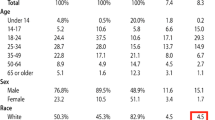Abstract
Racial profiling appears to be morally more troubling when the racial group that is the object of the profile suffers from background injustice. This article examines two accounts of this intuition. The responsibility-based account maintains that racial profiling is morally more problematic if the higher offender rate within the profiled group is the result of social injustices for which other groups in society are responsible. The expressive harm based account maintains that racial profiling is more problematic if it makes background injustice vivid and thereby causes the profiled to feel resentment. I raise problems with both accounts and suggest a third account. On the humiliation-based account, individuals who are subjected to racial profiling in a context of background injustice are placed in a situation in which they cannot prevent appearing to onlookers in a demeaning way.
Similar content being viewed by others
Notes
The assumption that racial profiling is efficient has been contested by Bernard Harcourt (2007) on the ground that it only encourages more crime to arise within the non-profiled group and thus does not necessarily diminish the overall amount of crime in society. In this paper, I do not discuss Harcourt’s arguments. I simply note that the moral concerns I enter into depend for their significance on there being at least some cases in which racial profiling is efficient.
Lippert-Rasmussen discusses unalloyed racial profiling in Lippert-Rasmussen (2006).
The background injustice intuition is supported by Lippert-Rasmussen in Lippert-Rasmussen (2006: 203–204).
This responsibility-based account of the background injustice intuition is drawn from Lippert-Rasmussen (2006).
This expressive harm based account of the background injustice intuition is drawn from Risse and Zeckhauser (2004).
Lippert-Rasmussen also finds the responsibility of the more advantaged for the higher offender rate within the profiled group relevant on the ground that it can entail that racial profiling is not ‘comprehensively justified’. A policy fails to be comprehensively justified when its rationale depends on the fact that those who advocate it undertake unjustified actions towards others. In what follows, I leave aside this part of Lippert-Rasmussen’s discussion. See Lippert-Rasmussen (2006: 197). The idea of ‘comprehensive justification’ was first put forward by G. A. Cohen in (1992).
Lippert-Rasmussen does not use the terms, ‘forfeiture’ and ‘waiving’, respectively; those are my terms.
For this line of criticism see Risse (2007).
My argument in this paragraph that what people are morally liable for need not be the consequences of their exercises of responsibility (so that a group’s unjust responsibility for the higher offender rate among another group does not necessarily make the former liable to a higher exposure to crime perpetrated by the latter) is indebted to Olsaretti (2009).
While Risse and Zeckhauser believe that racial profiling can cause expressive harm they believe that the weight we should assign such harm can be overestimated and that it therefore does not stand in the way of the legitimacy of racial profiling in a significant range of cases. See Risse and Zeckhauser (2004: 143–150).
That racial profiling can lead people to appear in a demeaning way is the basis of the humiliation-based account of the background injustice intuition I develop in Sect. 4. The humiliation-based account is thus a close cousin of the expressive harm account.
That Risse and Zeckhauser define ‘expressive harm’ in this way is suggested by their taking Randall Kennedy’s utilitarian assessment of racial profiling as their starting point in discussing of expressive harm. As they write (Risse and Zeckhauser 2004: 145): ‘In assessing the kinds of harm caused by profiling we follow Kennedy: the damage done seems to us well captured in terms of a feeling of resentment, sense of hurt, and loss of trust in law enforcement.’
My thoughts in this section have benefited from Velleman (2001).
When I say that a person should not appear in a ‘demeaning way’, I mean subjectively demeaning, or, in other words, that what counts as a demeaning appearance for the purpose of establishing whether someone is humiliated is what that person herself would consider demeaning. For example, it would be humiliating for a teenager who wants his friends to see him as a ‘tough guy’ if his mother told them that he is in fact a very sweet and considerate young man who likes to look after rabbits. Even if there is nothing wrong with being sweet and considerate, this teenager has still been humiliated by his mother because she has made him appear in a way that he himself finds demeaning.
I would like to thank the following people for their helpful comments on this paper: Ian Carter, Andrea Sangiovanni-Vincentelli, Serena Olsaretti, and the participants at the 2009 Copenhagen conference on ‘Racial Profiling’.
References
Bernard, Harcourt. 2007. Against prediction: Profiling, policing, and punishing in an actuarial age. Chicago: University of Chicago Press.
Cohen, G.A. 1992. Incentives, inequality and community. In The tanner lectures in human values 13, ed. G.B. Peterson, 263–329. Salt Lake City: University of Utah Press.
Lippert-Rasmussen, Kasper. 2006. Racial profiling versus community. Journal of Applied Philosophy 23: 191–205.
Olsaretti, Serena. 2009. Responsibility and the consequences of choice. Proceedings of the Aristotelian Society 109: 165–188.
Risse, Mathias. 2007. Racial profiling: A reply to two critics. Criminal Justice Ethics 26: 4–19.
Risse, Mathias., and Richard. Zeckhauser. 2004. Racial profiling. Philosophy & Public Affairs 32: 131–170.
Velleman, J. David. 2001. The genesis of shame. Philosophy & Public Affairs 30: 27–52.
Author information
Authors and Affiliations
Corresponding author
Rights and permissions
About this article
Cite this article
Bou-Habib, P. Racial Profiling and Background Injustice. J Ethics 15, 33–46 (2011). https://doi.org/10.1007/s10892-010-9091-x
Received:
Accepted:
Published:
Issue Date:
DOI: https://doi.org/10.1007/s10892-010-9091-x



